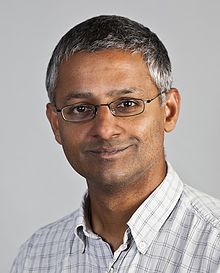Sir Shankar Balasubramanian | |
|---|---|
 | |
| Born | 30 September 1966[2] |
| Nationality | British |
| Alma mater | University of Cambridge |
| Known for |
|
| Awards |
|
| Scientific career | |
| Institutions | |
| Thesis | Studies on the reaction mechanism of chorismate synthase (1992) |
| Doctoral advisor | Chris Abell |
| Doctoral students | Julian Huppert[3][4] |
| Website | www |
Sir Shankar Balasubramanian (born 30 September 1966)[2] is an Indian-born British chemist[5][6] and Herchel Smith Professor[7] of Medicinal Chemistry in the Department of Chemistry at the University of Cambridge,[8][9] Senior Group Leader at the Cancer Research UK Cambridge Institute[10] and Fellow of Trinity College, Cambridge.[11] He is recognised for his contributions in the field of nucleic acids.[12] He is scientific founder of Solexa[13][14] and biomodal (formally Cambridge Epigenetix).[15][16]
- ^ Cite error: The named reference
embowas invoked but never defined (see the help page). - ^ a b c Anon (2017). "Balasubramanian, Prof. Shankar". Who's Who (online Oxford University Press ed.). Oxford: A & C Black. doi:10.1093/ww/9780199540884.013.256669. (Subscription or UK public library membership required.)
- ^ Huppert, J. L.; Balasubramanian, S. (2005). "Prevalence of quadruplexes in the human genome". Nucleic Acids Research. 33 (9): 2908–2916. doi:10.1093/nar/gki609. PMC 1140081. PMID 15914667.
- ^ Huppert, Julian Leon (2005). Studies on genomic G-quadruplexes. lib.cam.ac.uk (PhD thesis). University of Cambridge. OCLC 885437272. EThOS uk.bl.ethos.604822.
- ^ Balasubramanian, S (2007). "From DNA to mountain climbing. Shankar Balasubramanian talks to Alison Stoddart about his research and other interests". Molecular BioSystems. 3 (5): B37. PMID 17582897.
- ^ Balasubramanian, S (2013). "An interview with Shankar Balasubramanian". Trends in Biochemical Sciences. 38 (4): 170–1. doi:10.1016/j.tibs.2013.02.006. PMID 23522090.
- ^ "University of Cambridge, 2011. Herchel Smith Academics .". Archived from the original on 17 November 2012. [Accessed 8 April 2013].
- ^ "University of Cambridge, 2013. The Balasubramanian Group.". [Accessed 4 April 2013].
- ^ "Professor Sir Shankar Balasubramanian FMedSci FRS". Yusuf Hamied Department of Chemistry. Retrieved 13 December 2021.
- ^ Cite error: The named reference
Cancer Research UK Cambridge Institute 2021was invoked but never defined (see the help page). - ^ "Master & Fellows". Trinity College Cambridge. 10 November 2021. Retrieved 13 December 2021.
- ^ Shankar Balasubramanian's publications indexed by the Scopus bibliographic database. (subscription required)
- ^ Illumina, 2013. SBS Technology.[online] Available at: <"History of Illumina Sequencing". Archived from the original on 9 October 2014. Retrieved 21 October 2014.> [Accessed 8 April 2013]
- ^ Bentley, D. R.; Balasubramanian, S.; Swerdlow, H. P.; Smith, G. P.; Milton, J.; Brown, C. G.; Hall, K. P.; Evers, D. J.; Barnes, C. L.; Bignell, H. R.; Boutell, J. M.; Bryant, J.; Carter, R. J.; Keira Cheetham, R.; Cox, A. J.; Ellis, D. J.; Flatbush, M. R.; Gormley, N. A.; Humphray, S. J.; Irving, L. J.; Karbelashvili, M. S.; Kirk, S. M.; Li, H.; Liu, X.; Maisinger, K. S.; Murray, L. J.; Obradovic, B.; Ost, T.; Parkinson, M. L.; et al. (2008). "Accurate whole human genome sequencing using reversible terminator chemistry". Nature. 456 (7218): 53–59. Bibcode:2008Natur.456...53B. doi:10.1038/nature07517. PMC 2581791. PMID 18987734.
- ^ "Shankar Balasubramanian". biomodal integrates multiple modes of biology from a single sample in a single experiment to provide transformative insights into health and disease. 19 January 2020. Retrieved 13 December 2021.
- ^ "Shankar BALASUBRAMANIAN". companieshouse.gov.uk. London: Companies House. Archived from the original on 6 July 2016.